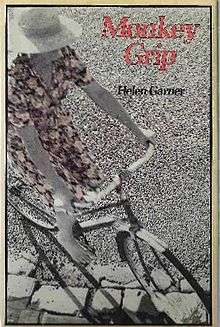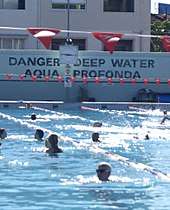Monkey Grip (novel)
 First edition | |
| Author | Helen Garner |
|---|---|
| Country | Australia |
| Language | English |
| Publisher | McPhee Gribble |
Publication date | 16 September 1977 |
| Media type | |
| Pages | 245 |
| ISBN | 0-14-004953-3 |
| OCLC | 11950836 |
| 823 19 | |
| LC Class | PR9619.3.G3 M6 1984 |
| Followed by | Honour & Other People's Children |
Monkey Grip is a 1977 novel by Australian writer Helen Garner, her first published book. It initially received a mixed critical reception, but has now become accepted as a classic of modern Australian literature. The novel deals with the life of single-mother Nora, as she narrates her increasingly tumultuous romantic relationship with a flaky heroin addict, juxtaposed with her raising a daughter while living in share houses in Melbourne during the late 1970s. A film based on the novel, also titled Monkey Grip, was released in 1982. In the 1990s, when critics identified the Australian literary genre of grunge lit, the book was retrospectively categorized as one of the first examples of this genre.
The novel, published at the height of a burgeoning counterculture movement and bohemia scene in Melbourne, achieved some degree of notoriety for its astute, uncompromising depiction of heroin addiction, sexuality, relationships and love. It became recognised as being one of Australia's "first contemporary novels", and long since its initial publication, has come to be regarded as being the "voice of a generation".[1] Furthermore, it helped establish the career of Helen Garner, who is now one of the most well-known writers in Australia.[2] Garner later admitted that there was an autobiographical element to the novel, with much of its plot being diaristic and based on her own experiences.[3][4]
In 2018, Monkey Grip was selected by the British Broadcasting Corporation (BBC) as number 47 of a list of "100 stories that shaped the world"–the only Australian novel on the list.[5]
Plot summary
The novel is set in the inner city suburbs of Melbourne in the mid 1970s. The characters inhabit a lively social circle, frequenting cafés, restaurants, theatres, pubs and clubs in the city. Nora, a single mother in her thirties, and her young daughter Grace, live in a succession of share houses. Nora is in love with the notoriously unreliable Javo, a twentysomething heroin addict, who repeatedly drifts out of Nora's life, then back into it again.[6] Other characters, including Rita, a single mother and Nora's housemate, Gerald, Francis, Joss, Bill, Willy, Claire and Martin (a former flame of Nora’s), also drift in and out of the story. Most of the characters are artists, actors and creative types, many of them frequent the Fitzroy baths in summer. Nora, a freelance journalist, takes small acting gigs in independent films and edits a women's newspaper in between jobs to make ends meet.
Nora's relationship with the flaky Javo is first put under strain when he is arrested in Bangkok for drug possession. As he returns, their relationship seems to ebb and flow: while at a high point the tentative couple, along with Nora's daughter Grace, go on trips across the country, first to Hobart, then a road trip to Sydney, however when it is at its lowest point, Javo steals from the share house to support his heroin habit and disappears for days on end–leaving Nora to wonder about his whereabouts and contemplate his return.
As their relationship intensifies, Nora questions how much of herself will be left if she is wrenched away by a love that is doomed to end. As their relationship approaches an eventual disintegration due to Javo's drug addiction, deception and unsavoury behaviour, Nora takes a short trip to Anglesea to clear her mind. Around this time, Javo pursues Nora's friend Claire, while Nora is forced to start anew and contemplate her feelings towards the futility of their fleeting love affair.
Publication and title

Much of the novel was based on Helen Garner’s own experiences living in sharehouses in Fitzroy and Carlton in the mid 70s–the relationship between Nora and Javo is based on a relationship Garner had during her time living in sharehousing while raising her daughter. James Shuvus Williamson, a heroin addict who Garner was romantically involved with, was who she modelled the character of Javo upon.[7] Most of the novel was written in the Latrobe Reading Room at the State Library of Victoria.
Upon completion, Garner took a manuscript to Colin Talbot at Outback Press.[8] This early draft did not feature the love story between Nora and Javo.[8] Talbot suggested Garner try to shape her writing into a narrative, fleshing out certain relationships she had written about. After making significant changes, Garner finally sent a copy to McPhee Gribble, an independent publishing house in Melbourne run by two women, after it was rejected by one male editor at a large publishing house for being "too emotional".[9][10]
Di Gribble of McPhee Gribble, the book's first publisher, wrote that the title of the novel referred to both a linking of hands and the monkey on your back of drug addiction.[11]
Themes
Kerryn Goldsworthy writes that almost all of Garner's fiction addresses "the relationship between sexual behaviour and social organisation; the anarchic nature of desire and the orderly face of the institution of 'family'".[12] The plot point of Nora's obsessive love for Javo is matched by Javo's addiction to heroin–although the source of obsession is different for both people, it possesses a similarly destructive power over a person.
The book makes numerous references to the sacred Chinese divination text I Ching, which Nora consults several times for guidance.
Critical reception
Monkey Grip initially met with a mixed reception in Australia.[13] Some critics praised Garner's writing, including Peter Corris, who called the writing "attractive and accessible, a pleasure to read" and further commented "[Garner] has the ability to capture movement and stillness and light and sound with words which belong to writers like E.M. Forster and, to give a different but appropriate example, Jack Kerouac".[14] is now recognised as a classic of modern Australian literature.[15]
In 1978, Garner was awarded the Book of the Year Award by the National Book Council for Monkey Grip–making her the first woman in Australia to win the award.[16] The panel acknowledged that it was "not an easy choice", given that the book's subject matter included "heroin addiction, inner-city communal living and obsessional love".[16] They further stated that the central character, Nora, is "superbly realised in her hesitancies and enthusiasms", that the book was "beautifully constructed", and that Garner had been "utterly honest in demonstrating the dilemmas of freedom, and particularly of social and sexual freedom for women trying to create for themselves a role which will recognise their full humanity".[16]
The novel was released internationally in Europe and the United States in the late 1970s and early 1980s.[17] It was met with a modest acclaim there–with the London Times writing "the actual force of the author's prose carries the novel along like a strong drink" and Vogue similarly praising the book for Garner's "deliberately laconic style", further stating she "renders her experiences with imagination to produce a novel that is chilling to read, cut and coloured with hard energy and strong feeling".[18]
It has been translated into several languages, including French and Italian.[16]
By the time of the release of the film adaptation, the novel had sold in excess of 100,000 copies.[16] It has been taught widely in high schools and universities.[14][19]
In 2018, the book was voted number 47 on a list of 100 stories that changed the world, "stories they felt had shaped mindsets or influenced history",[20] by a survey of 108 "critics, scholars and journalists" polled by the BBC.[21]
Movie adaptation
In 1982, the novel was adapted to the film Monkey Grip directed by Ken Cameron from his own screenplay. The lead actors were Noni Hazlehurst as Nora and Colin Friels as Javo.
References
- ↑ "Helen Garner's Monkey Grip". ABC. 1 October 2014. Retrieved 3 September 2017.
- ↑ "Helen Garner on murderer Robert Farquharson". The Australian. 25 March 2017. Retrieved 3 September 2017.
- ↑ Bennett, Tegan (3 November 2012). "A phone call to Helen Garner". The Australian. Retrieved 26 December 2017.
- ↑ Rooney, Brigid (2009). Literary Activists: Writer-intellectuals and Australian public life. University of Queensland Press. p. 154. ISBN 9-78070224-143-7.
- ↑ "The 100 stories which shaped the world". BBC. 22 May 2018. Retrieved 23 July 2018.
- ↑ Tegan Bennett Daylight (3 November 2012). "A phone call to Helen Garner". The Australian. News Corp Australia. Retrieved 13 April 2016.
- ↑ "Monkey Grip - Melbourne Writer's Festival". MWF. 29 September 2014. Retrieved 22 September 2018.
- 1 2 Brennan 2017, p. 43
- ↑ "Helen Garner on Monkey Grip's diaristic birth". YouTube. 25 August 2013. Retrieved 30 September 2018.
- ↑ "Friday essay: the remarkable, prize-winning rise of our small publishers". The Conversation. 4 May 2018. Retrieved 4 May 2018.
- ↑ Frizell, Helen (13 October 1978). "The year's best books – 1. Helen Garner's Monkey Grip". The Sydney Morning Herald. Fairfax Media. Retrieved 13 April 2016.
- ↑ Goldsworthy, Kerryn (1996) Australian Writers: Helen Garner, Melbourne, Oxford University Press, p. 28
- ↑ Goldsworthy (1996) p. 1
- 1 2 Brennan 2017, p. 45
- ↑ Monkey Grip, Penguin Classics
- 1 2 3 4 5 Brennan 2017, p. 48
- ↑ "Paradise, Australian style". The New York Times. 4 April 1982. Retrieved 10 February 2018.
- ↑ Monkey Grip (First US ed.). New York: Seaview Books. 1977. ISBN 9-780-87223677-6.
- ↑ Daylight, Tegan Bennett (24 December 2017). "'The difficulty is the point': teaching spoon-fed students how to really read". The Guardian. Retrieved 29 December 2017.
- ↑ "The 100 stories that changed the world". BBC Online. British Broadcasting Corporation. 22 May 2018. Retrieved 28 May 2018.
- ↑ "The 100 world-shaping stories: who voted?". BBC online. British Broadcasting Corporation. 22 May 2018. Retrieved 28 May 2018.
Bibliography
- Brennan, Bernadette (2017). A Writing Life: Helen Garner and Her Work. Text Publishing. p. 48. ISBN 9-78192541-039-6.
External links
- "Helen Garner's Monkey Grip", documentary about background and impact of the book
- Monkey Grip, including an extract, Penguin Books Australia